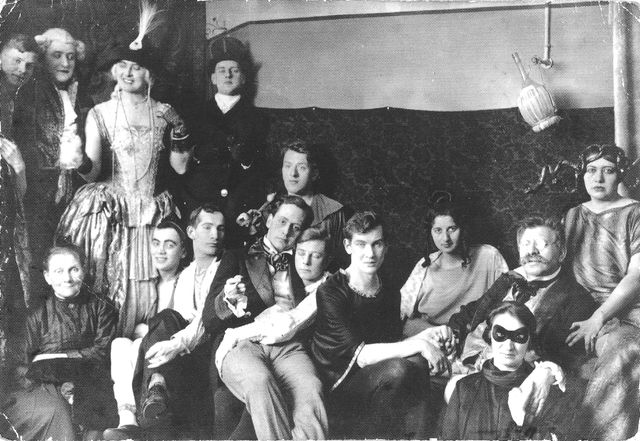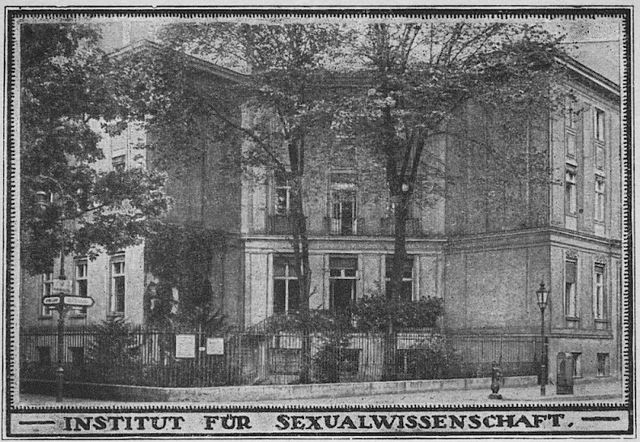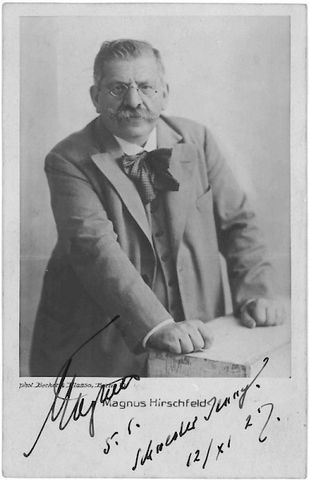Magnus Hirschfeld and HKW

Today, parts of HKW stand on the former site of the Institut für Sexualwissenschaft, founded by physician and activist Magnus Hirschfeld. Thematic points of contact in the program of HKW also illustrate connections to Hirschfeld who, with his approaches, is regarded as the pioneer of queer studies. From the turn of the century to the Weimar Republic, Hirschfeld worked as a sexologist in Berlin and became known in particular for his advocacy of decriminalization of homosexuals. In 1897, together with Max Spohr, Eduard Oberg and Franz Joseph von Bülow, he founded the Scientific-Humanitarian Committee in Berlin Charlottenburg. The committee opposed laws that criminalized homosexuality and is considered the world’s first organization dedicated to social recognition of same-sex love and homosexuality. Hirschfeld dealt early on with differences from the normalized, binary gender order, for example as the editor of the regular Jahrbuch für sexuelle Zwischenstufen (1899-1923). Despite his legacy and approaches that were precedent setting for the age in sexual research, Hirschfeld’s biologistic and eugenic theses are also critically appraised today.
The Institute and its Location
The Institut für Sexualwissenschaft was jointly opened by Magnus Hirschfeld and the physicians Friedrich Wertheim and Arthur Kronfeld on July 6, 1919. Dedicated to scientific debate, it formed a focal point for well-founded information on the study of sexuality. The institute’s core practical missions were also the treatment of venereal diseases, marriage and sexual counseling as well as support services for homosexual and trans-identifying people. The institute became a center of the international homosexual movement and was committed to social recognition. The institute also gained popularity through the preparation of expert reports in trials over official gender and name changes of intersex persons.

The institute was housed in a building that was centrally located in Berlin’s Tiergarten district at the former corner of Beethovenstraße 3 and In den Zelten 10. During the HKW project Wohnungsfrage, the artist Maria Eichhorn explored the present-day area around HKW and the former Institut für Sexualwissenschaft and its sacking and expropriation in the wake of intensifying National Socialist repression after the seizure of power in 1933. The institute building was destroyed during the Second World War. In 1956, on a section of the former institute lot construction began of the Kongresshalle, which has been used by HKW since 1989.

The Hirschfeld Bar and queer issues at HKW
His Jewish identity increasingly exposed Magnus Hirschfeld to threats. From 1930 he lived in exile and died in Nice in 1935. During Wohnungsfrage the Hirschfeld Bar at HKW was named after the sexologist. HKW also makes Hirschfeld’s geographical and historical heritage visible in its projects by taking up various activist ideas and approaches of the sexologist. In its program, HKW campaigns for the visibility of different lifeworlds and draws attention to marginalization processes. In addition, HKW aims to offer a platform for partner events dealing with queer and non-normative lifeworlds, such as the international LGBTIQ* conference . Since 1992, the has also tackled the debate over Hirschfeld’s scientific heritage and the history of the sexual sciences.
His Jewish identity increasingly exposed Magnus Hirschfeld to threats. From 1930 he lived in exile and died in Nice in 1935. During Wohnungsfrage the Hirschfeld Bar at HKW was named after the sexologist. HKW also makes Hirschfeld’s geographical and historical heritage visible in its projects by taking up various activist ideas and approaches of the sexologist. In its program, HKW campaigns for the visibility of different lifeworlds and draws attention to marginalization processes. In addition, HKW aims to offer a platform for partner events dealing with queer and non-normative lifestyles, such as the international LGBTIQ* conference Queering Memory. Archives – Arts – Audiences. Since 1992, the Magnus Hirschfeld Society has also tackled the debate over Hirschfeld’s scientific heritage and the history of the sexual sciences.